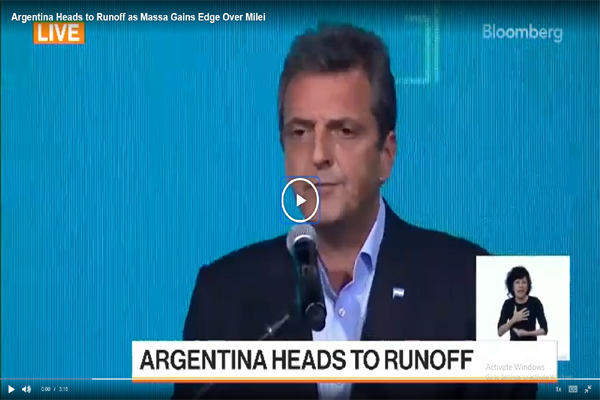
Manuela Tobias and Scott Squires, Bloomberg News
BUENOS AIRES
EnergiesNet.com 10 23 2023
Argentina’s election will be settled in a presidential runoff between Economy Minister Sergio Massa, who defied expectations to snatch the lead in Sunday’s election, and libertarian outsider Javier Milei. It’s a politically polarizing scenario that investors had feared most.
With the votes nearly all counted, Massa secured 37% while Milei received 30%, leaving both below the necessary thresholds to win outright. Massa, 51, and Milei, 53, will face each other in a second round. The results mark a reversal of fortunes for Massa, whose ruling coalition came third in August primaries.
Patricia Bullrich, the establishment pro-business candidate, came third with 24% of votes. Her exit raises concerns about the future of a center-right coalition that until recently was seen as the most likely to supplant the ruling Peronist alliance. Her votes are now up for grabs, and both Massa and Milei lost no time in making overtures in their speeches.
Next month’s runoff will finally settle the drawn-out question of who will be saddled with the impossible task of saving a once-rich country on the verge of collapse. It pits two candidates with diametrically opposed views.
The veteran from the Peronist movement — which has governed Argentina for most of last 20 years and refuses to die despite its disastrous economic legacy — will come against the radical libertarian with no government experience who wants to dollarize the economy to kill inflation galloping above 138%.
Until then, Argentina will have to endure another month of volatility as Massa and Milei scramble to win the votes needed to clinch the top job. In his double role as economic czar and presidential candidate, Massa has deployed all his political cunning in past weeks to cut taxes and increase social spending to drum up popular support — even at the cost of accelerating an economic crisis for the IMF’s biggest borrower.
His first round lead indicates that this strategy worked and it was straight out of the playbook that Brazil’s Luiz Inacio Lula da Silva gave him. “Stop accumulating dollars, it’s time to gather votes” — that was the advise given by the leftist leader next door and there’s no incentive for Massa to change course with the presidency tantalizingly within reach.
South America’s second-largest economy reached the vote with heightened anxiety as a range of businesses suspended sales, savers withdrew dollars from the bank and brokerages halted taking new orders on certain investments. To stay competitive in the race Massa will likely try to avoid devaluing the currency, which he did the day after the primary vote, even if that risks depleting international reserves even further.
Market Worries
The Massa-Milei final was the outcome that bond investors worried about because it prolongs the uncertainty at a time Argentina desperately needs policy changes. Most of its international notes have lingered below 30 cents on the dollar in recent weeks, with surging yields that signal a 10th default is looming as major debt repayments resume next year.
What Bloomberg Economics Say
“Massa first, Milei second is possibly the worst-case scenario for markets. It prolongs already-high uncertainty for another four weeks, with neither likely to provide granular detail on their policy plans. Massa could now double down on his populist approach of an artificially strong peso, interventionism and fiscally costly measures.”
— Adriana Dupita, Argentina’s economist
The country is facing its sixth recession in a decade and saw inflation spike to the highest level since the nation exited hyperinflation in the early 1990s. The continued slide of the Argentine peso has led to the gap between the official and parallel rates surging past 170%.
The fate of Argentina’s $43 billion program with the International Monetary Fund awaits either Massa or Milei when a new government takes office Dec. 10.
The program is way off track and Massa hasn’t complied with any of the key targets that are usually crucial for the IMF to continue disbursing money, which is Argentina’s only major source of international finance. IMF officials have called on the next government to swiftly reset the economy, emphasizing there’s no time for gradual policies.
Next Moves
In their post-election speeches, Massa and Milei tried to appeal to the third of the votes that didn’t support them. Massa promises to stabilize the economy, offering Argentines a false sense that what ails the economy can be fixed without painful measures. It became clear that while many want change, just as many weren’t willing to jump into the unknown.
That is what Milei represents, with his pledge to replace the peso with the US dollar as Argentina’s currency and to close the central bank. By dropping into second place, the risk for him is that voters will reject the kind of extreme policy medicine he wants to prescribe and live off a bit longer on the state’s largesse even with 40% of the population in poverty.
It was Milei’s birthday and he was thanking the crowds at his post-election rally for all the gifts — even if the greatest present of all eluded him. Given all the momentum he’d picked up, there had been some predicting he could win outright tonight. He fell well short of that.
Yet his energy levels were undiminished and given both August and October yielded suprising results, the runoff has all the makings of a cliffhanger.
“I’m willing to do tabula rasa, deal the cards again,” Milei said to an energized crowd in Buenos Aires amid chants of “Long live freedom, dammit!”
bloomberg.com 10 22 2023







